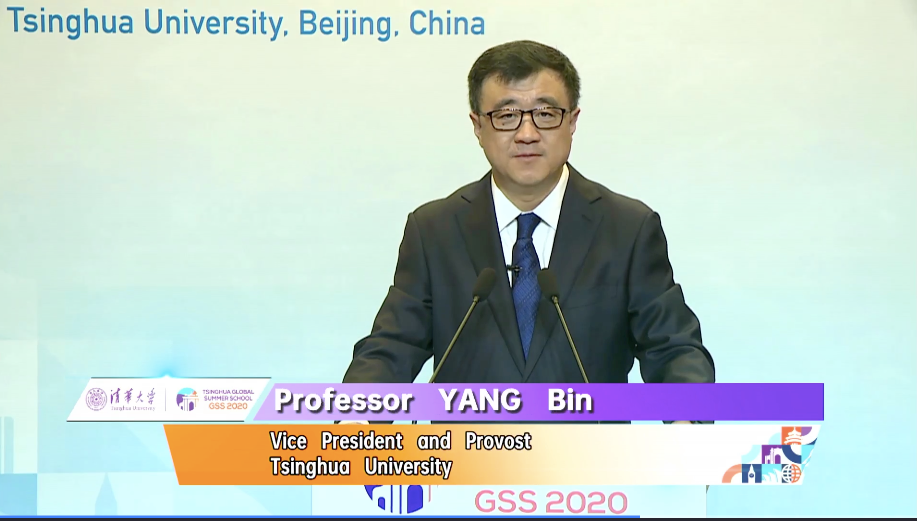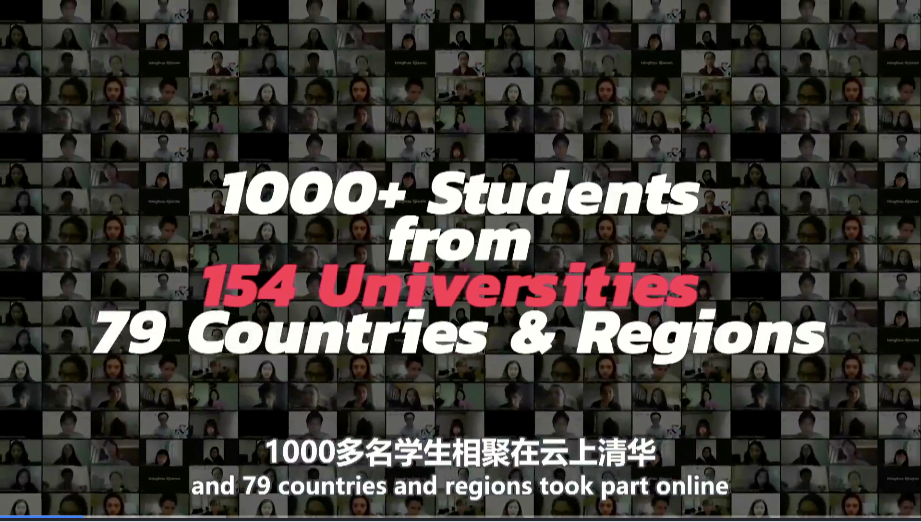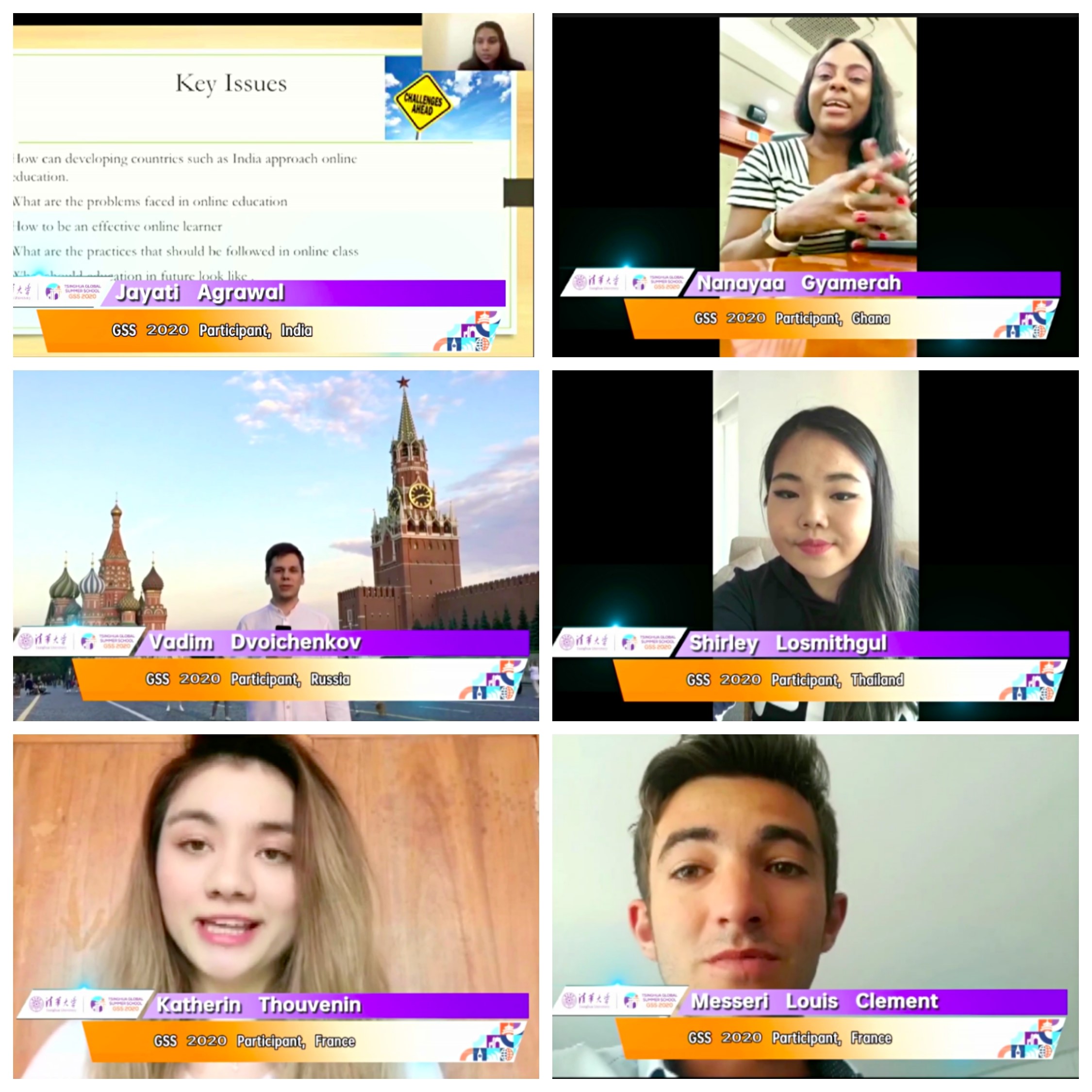Tsinghua University wrapped up its special online Global Summer School (GSS) 2020 on Tuesday.
Over 1,000 young talents from 154 universities across 79 different countries and regions attended the first-of-its-kind virtual summer school launched by Tsinghua, and undertook courses taught by distinguished scholars and practitioners from China and abroad on the theme “Toward a Post-Pandemic World”.
The GSS 2020 lasted for nine days.
Vice President and Provost of Tsinghua University Yang Bin delivered remarks at the closing ceremony, which was held virtually and broadcast live on various media platforms on Tuesday evening.

He congratulated and thanked all the participants on behalf of Tsinghua for taking part in the GSS 2020 online and exploring the post-pandemic world through various disciplines including economics, education, society, artificial intelligence, climate change and leadership.
He said, as Tsinghua’s first ever virtual summer school, the GSS 2020 was able to break through barriers of learning, participation and communication to reach an even greater audience. “Like the year 2020, this year’s summer school has also been extraordinary, “he said.
Vice President Yang pointed out five key terms—social responsibility, global, interdisciplinary, humility and community—to highlight the significance of the summer school.
“To put these five terms together, GSS aspires to foster an interdisciplinary-focused global community dedicated to making meaningful contributions to society,” he added.
Stating that understanding China was imperative for aspiring leaders to become truly global citizens, he expressed the hope that the GSS experience would lead all the participating young students on to future learning and connections with China in the future.
“I hope that through GSS 2020 you have been challenged and inspired: challenged to deepen and expand your thinking, and inspired to dream big and learn more about China,” he added.
He also urged all the GSS 2020 participants to explore future study or research opportunities at Tsinghua through its diverse English-taught masters’ programs, exchange student programs or visiting scholar positions.
Vice President Yang thanked all the summer school speakers and academic support departments and schools for their enriching content as well as the staff of the Tsinghua Office of International Affairs, XuetangX and the Information and Technology Center for their efforts behind the scenes to make the summer school possible.
Altogether 17 academic institutions of Tsinghua, including eleven schools, departments and institutions, four overseas bases and two international higher education alliances initiated by the university were involved in this year’s summer school, which featured lectures, keynote speeches and group discussions on nine different themes with reference to the post-pandemic world, virtual cultural events as well as virtual tours of Tsinghua University History Museum and Campus, Lenovo and Huawei. All the keynote speeches delivered at the GSS 2020 were open to the public.

A short video of highlights that summed up GSS 2020 and showcased the students and the speakers was played during the closing ceremony.
In the video, Professor Xue Lan, Faculty Chair of GSS 2020 and Dean of Schwarzman College at Tsinghua, said the summer school was a wonderful way for many of the international students to learn about China and Tsinghua University, and also about cutting edge knowledge in different fields.
Professor Li Jinliang, Dean of the International Affairs Office, said, “This online summer school is an innovation. Its boundless nature enables it to reach a wider group of students across the globe.”
Six student representatives of the GSS 2020 addressed the closing ceremony, sharing their GSS experience. They were Jayati Agrawal from India, Nanayaa Eunice Gyamerah from Ghana, Vadim Dvoichenkov from Russia, Shirley Losmithgul from Thailand, and Katherin Thouvenin and Messeri Louis Clement from France.

Nanayaa Eunice Gyamerah from Ghana, who is currently pursuing her master’s in South Korea, said it was very laudable that Tsinghua University, amid the global pandemic and economic meltdown across the globe, thought about global leaders across the world, organized the virtual summer school and brought students, speakers, professors and lecturers from across the globe into one virtual space to deliberate on how to move forward in the post-pandemic world.
“The GSS was such an eye-opener,” she said. Impressed by a session of Tsinghua’s School of Environment at the GSS, she said she wanted to apply for a doctoral program in environmental science, engineering and management at Tsinghua in the future.
Jayati Agrawal from India said her experience at Tsinghua GSS 2020 was the experience of a lifetime beyond expectations. “By conducting a virtual Global Summer School, Tsinghua has set a benchmark for all other universities.”
Messeri Louis Clement from France said that he was grateful to have an opportunity to take part in the GSS 2020 and be able to connect with people from across the world including Tsinghua University and learn from them, especially at a time of quarantine where a lot of people have been stuck at home. He said the summer school offered more in-depth understanding on topics like climate change which he wanted to work on as an engineer.
Results of a survey about the program were also shared by John Paul, the moderator, at the ceremony. The majority of the participating students surveyed spoke highly of the program. They said the program met their expectations and was beneficial for their learning, according to the survey.
Prior to the closing ceremony, Prof. Jiang Xiaojuan, who is Dean of the School of Public Policy and Management, Tsinghua University, delivered a closing keynote presentation on “Globalization and its Governance in the Digital Age.”
She talked about three aspects of the globalization—products, enterprises and economies; digital globalization; and the governance concept and value of digital globalization.
“In this era, no one has such authority to make universal rules for the globe. We must cooperate,” she said.
According to her, inclusiveness, respect, maximizing human interest, human prosperity, sustainability and harmony should be the values for governance in the digital age.
“In the digital era, physical, cultural and intellectual ties between nations and individuals are becoming closer and deeper. We are indeed in the age of a digital planet. Therefore, digital governance must be global,” she added.
Writer: Sangeet Sangroula
Editors: Guo Lili, John Olbrich

